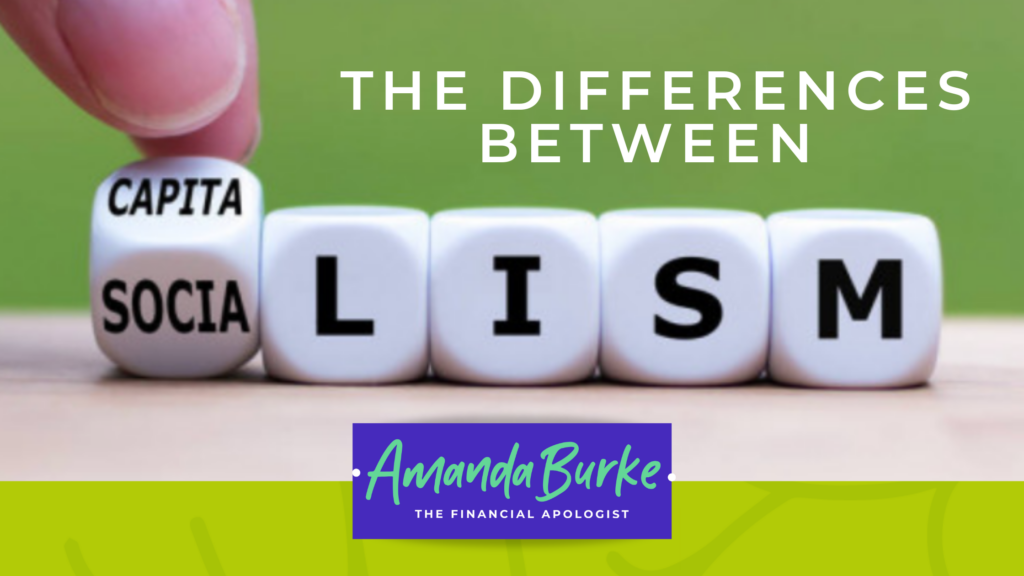Few words are as misunderstood these days as “capitalism” and “socialism.” Capitalism is a term that consistently misunderstood due to the notion that it brings about class structures. In contrast, socialism has been propped up and promoted as a utopian economic system. But few people seem to understand what each financial system entails. So we’re here to lay out some foundational differences between the two.
Capitalism
Let’s get a few myths out of the way and discuss what capitalism is *not.* Free market capitalism does not entail conquering foreign nations and forcing the native populations into servitude. It does not involve greedy wealthy business owners seeking to exploit consumers at every point for their gain. Nor does it entail large businesses colluding with the government to rig the economy in their favor. Instead, capitalism operates on several fundamental principles that all work together.
The first is competition. When many different producers have to compete for customers, there are built-in incentives for these businesses to provide a better product and lower their prices.
The second is voluntary cooperation. Producers and consumers must cooperate to create. Though other businesses have to compete for customers, there is a symbiotic relationship once the two connect. The industry needs customers, and customers need the business’s product or service. When the two voluntarily come together at an agreed price point, everyone emerges as a winner.
The third is the Rule of Law. Contrary to what detractors claim, a free market does not require a complete absence of government. There has to be some entity that enforces contracts, protects property rights, and prosecutes fraud. But the government must act in predictable ways in a given set of circumstances. In a free-market economy, we must be secure in our rights when deciding on a course of action.
Fourth is the creation of wealth. In centuries past, plundering others was a common means to acquire wealth. Free market capitalism allows individuals to create wealth by serving others. As the late Walter Williams so eloquently wrote:
This principle rejects a zero-sum game view. One’s wealth does not take what another person could acquire. The pie is not fixed but can grow exponentially in a capitalist free market.
The essence of free-market capitalism is the individual’s autonomy and the protection of that person’s liberty. A free market does not tolerate businesses lobbying the government to pass laws that smaller competitors cannot comply with. The objective of a free market is for individuals to create wealth by serving others.
Socialism
Socialism is, in one sense, the opposite of capitalism. Its ideological roots are in Marxism and its tenets demand an authoritarian government. This economic system emphasizes the group over the individual, but ends up destroying both in the process. From our view, there are three principles underpinning socialism.
First is central economic planning. Socialist economics involve State control over all financial aspects of life (and often beyond that). The government sets taxes, prices, quotas, trade restrictions, etc., to equalize conditions. If one rises too high, the State can swoop in and confiscate that person’s wealth at its pleasure. The State sets the goals and determines who gets what. The State plans, and in the process, makes planning very difficult for the individual.
The second is collectivism. Like its direct ancestor, Communism, socialism assesses the world through the lens of group identity. Those in higher economic classes are oppressors who have obtained their wealth through the systematic exploitation of lower classes. Therefore, the lower classes must use the State’s power to “take back” what was theirs. This concept cancels out every successful person’s story. It imposes an identity that they do not belong to. This creates the “us vs. them” mentality, which leads nowhere healthy and productive.
The third is envy. Building off the previous point, those who are not the “1%,” or the “bourgeoisie,” etc., are “others” or the have-nots. Though, especially in the West, many of these people are already the top 1% of wealthy individuals. But this does not matter in a socialist worldview. What matters is that others have more than a given person or group of people and that these successful people shouldn’t have what they do. The State becomes a conduit for taking the fruit of others’ labor, regardless of how they acquired it.
Conclusion
Capitalism and socialism are worlds apart. Capitalism is the voluntary exchange and protection of one’s productivity. Socialism is based on the forceful redistribution of our labor to equalize outcomes. We can look to the past to show that socialism has led to mass poverty and suffering.
Follow us for more on the Christian’s response to socialism and capitalism!

